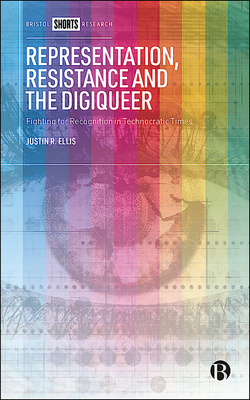Representation, Resistance and the Digiqueer
Fighting for Recognition in Technocratic Times
By Justin Ellis
Published
May 16, 2023Page count
172 pagesISBN
978-1529228717Dimensions
203 x 127 mmImprint
Bristol University PressPublished
May 16, 2023Page count
172 pagesISBN
978-1529228724Dimensions
203 x 127 mmImprint
Bristol University PressPublished
May 16, 2023Page count
172 pagesISBN
978-1529228724Dimensions
203 x 127 mmImprint
Bristol University PressDigital media technologies have enabled some LGBTQ+ individuals and communities to successfully organize for basic rights and justice. But these technologies can also present risks, such as online and in-person harassment and assault, and unsettled standards of privacy and consent.
Justin Ellis provides new insights on LGBTQ+ identity formation through social media networks and platform biometrics. Drawing on debate over gender, procreation, religion, nationalism and tech-regulation, he considers the effects of surveillance technologies on LGBTQ+ agency. In doing so, he brings an interdisciplinary ‘digiqueer’ perspective to negotiations of LGBTQ+ identity through case studies of digital harms from case law, parliamentary debates, social and mainstream media and LGBTQ-tech advocacy.
“A must-read not only for academics, media practitioners, and activists, but also for anyone seeking to understand why, despite a range of protections for LGBTQ+ citizens across many jurisdictions, bigotry and hatred against these communities persists and continues to grow.” Crime, Media, Culture
“This is a trailblazing and incisive examination of the contradictory connectivity between digital media, queer identity and justice. It is a must-read for scholars and activists interested in sexual politics and representation.” Gail Mason, Sydney Law School
“Mixing critique and hope, this timely book reminds us that fusing digital technologies and daily life cuts both ways for queer identities. LGBTQ people create pleasure and recognition as they navigate surveillance and harassment. Ellis offers a much-needed push to seize queerness as an unsettling practice of resistance.” Mary L. Gray, Indiana University
Justin Ellis is Senior Lecturer in Criminology at the University of Newcastle. He leads research on ‘digiqueer’ criminology, which considers the impact of digital media technologies on LGBTQ agency.
1. Information Warfare in Technocratic Times
2. The Digiqueer Fight Against Algorithmic Governance
3. Information Warfare Against Drag Queen Storytime
4. (Mis)Representation of Same-Sex Attraction
5. Digiqueer Activism, Advocacy and Allyship
6. Data Driven Times?












